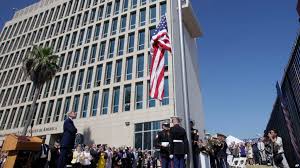In September 2017, the U.S. State Department announced that U.S. embassy employees in Havana, Cuba had been targeted by mysterious attacks, which caused 24 U.S. officials and their spouses to fall ill.
Symptoms included hearing loss, dizziness, headaches, fatigue, cognitive issues and difficulty sleeping.
Evacuation and Travel Warnings
The State Department ordered the evacuation of much of its Cuban embassy staff and warned U.S. citizens against traveling to Cuba. “Because our personnel’s safety is at risk, and we are unable to identify the source of the attacks, we believe U.S. citizens may also be at risk and warn them not to travel to Cuba,” the State Department warning said.
The U.S. Embassy in Cuba also warned that attacks have also occurred in the Hotel Nacional and the Hotel Capri — two upper-scale tourist accommodations.
Evidence & Information Sharing
The incident has further frayed relations between the two countries as a majority of U.S. diplomats left Havana and the U.S. government ordered 15 Cuban officials to leave their embassy in Washington, D.C.
The Cuban government denies responsibility for the attacks and says there is no evidence proving the attack against the Americans. In November, Cuban Foreign Minister Bruno Rodríguez met with about a dozen of U.S. senators and House members and communicated that Cuba is cooperating on the investigation.
By December, physicians treating the victims found evidence of brain abnormalities. Specifically, doctors discovered changes in the white matter tracts that act like information highways between brain cells, according to the Associated Press. “It’s the most specific finding to date about physical damage, showing that whatever it was that harmed the Americans, it led to perceptible changes in their brains,” a Dec. 6 AP article said.
Doctors are now referring sonic attacks as “directional acoustic phenomena,” according to the Associated Press. The physicians’ findings are expected to be published in the Journal of the American Medical Association.
Mystery Remains
Much of the mystery over the attacks remains, and U.S. investigators are being careful about sharing information.
“We are convinced these were targeted attacks,” U.S. Secretary of State Rex Tillerson said at a Dec. 6 news conference in Brussels. He added the United States has reservations about sharing information about its findings for two reasons: to respect for the privacy of the victims and to prevent the perpetrator from gaining useful information about its effectiveness.
“What we’ve said to the Cubans is a small island, you got a sophisticated security apparatus, you probably know who’s doing it, you can stop it. It’s as simple as that,” Tillerson added.
